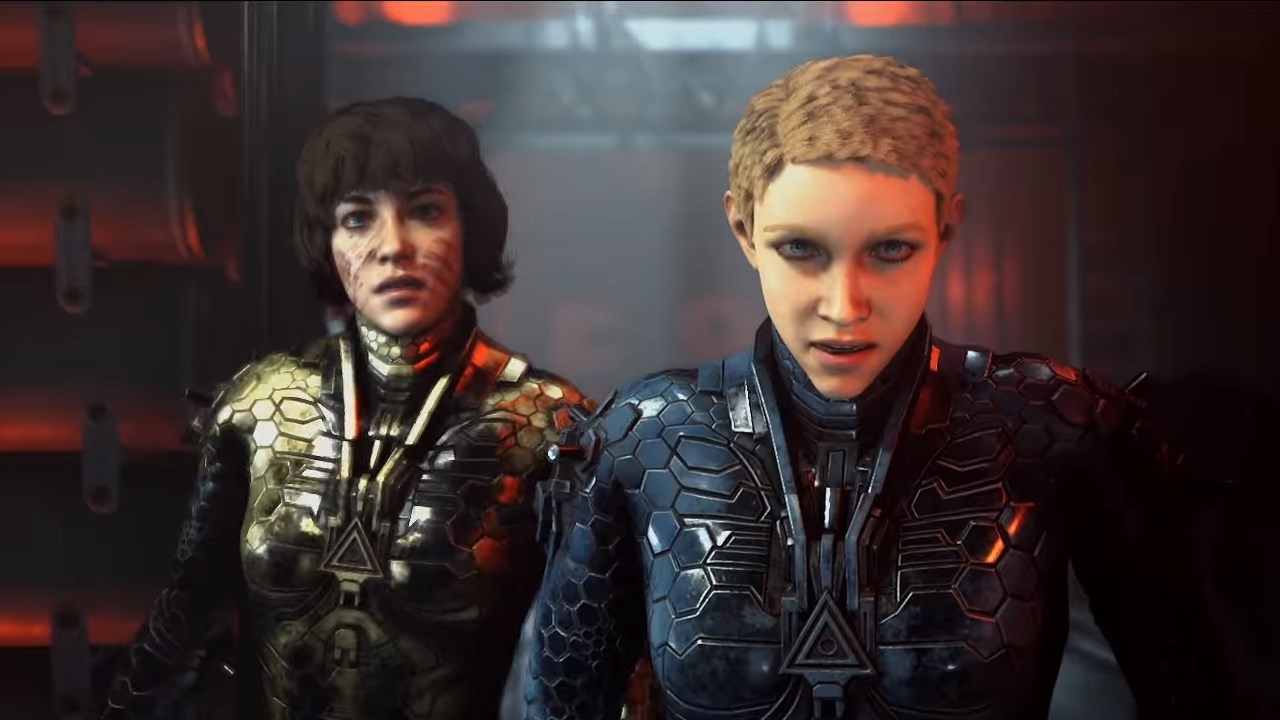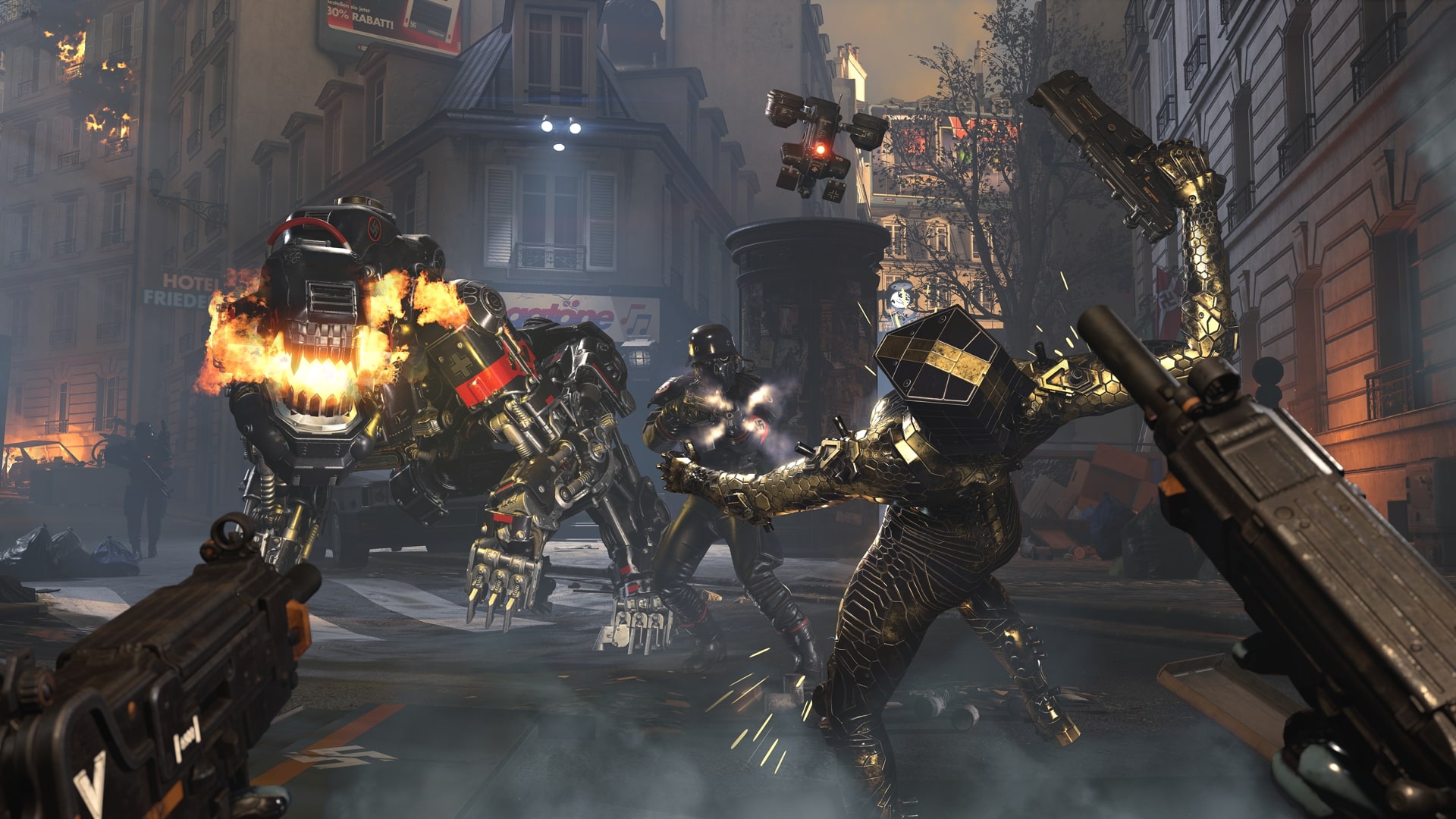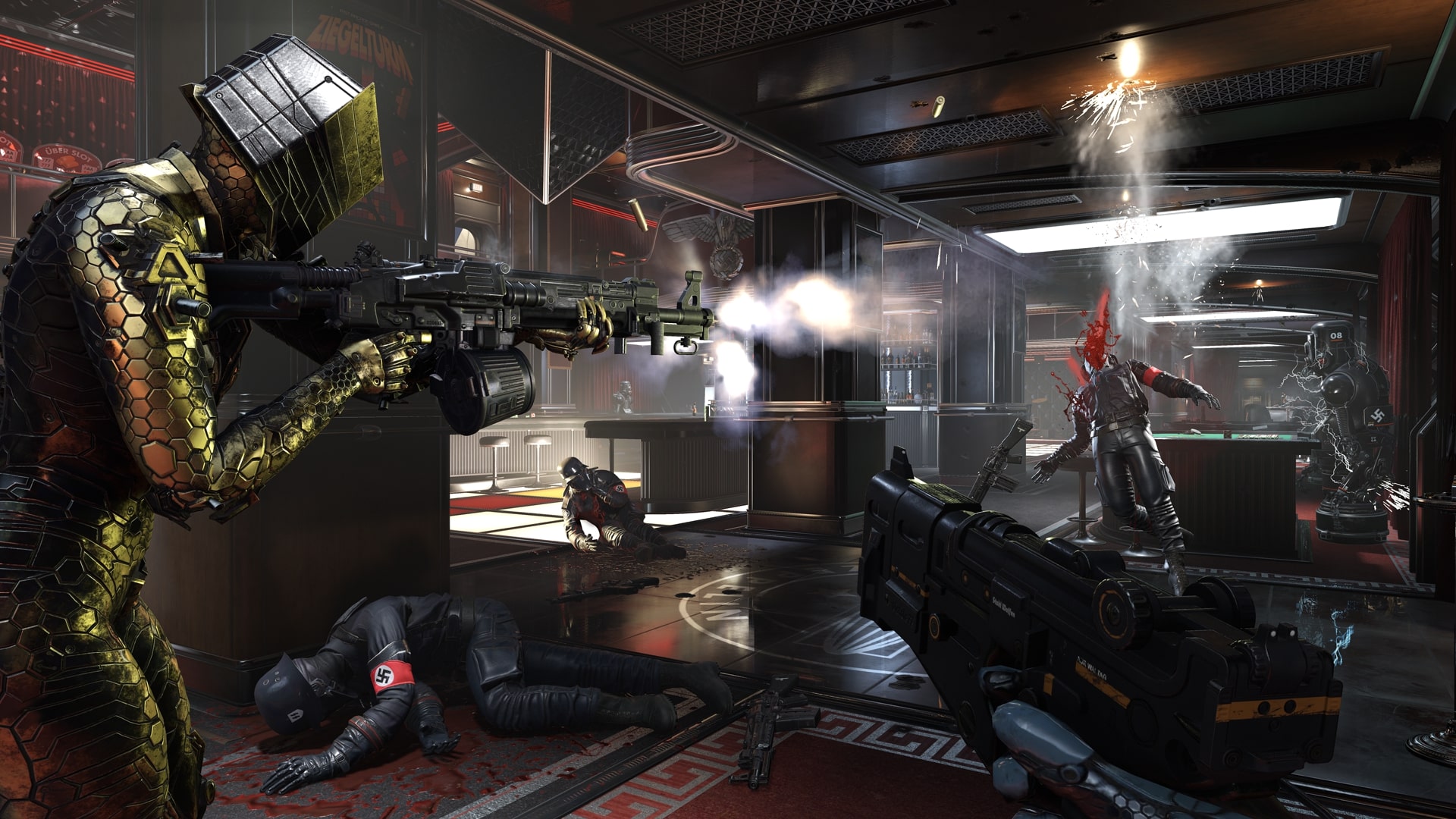Wolfenstein: Youngblood went all-in on co-op, and it feels like it paid off
BJ's daughters are all grown up and ready to kick some ass

One of the first scenes in Wolfenstein: Youngblood perfectly sums up the game's tone. Twin protagonists Jess and Soph learn that their father, BJ Blazkowicz, has gone missing in Nazi-controlled Paris, so they steal some super suits and strike out on their own to find him. The thing is, for all the lessons they received from their parents, Jess and Soph have never actually fought the Nazis. They're trained killers, but not practiced ones. I won't spoil the specifics, but their first real Nazi kill is about as messy as it gets, and it makes for a gruesome, wild, gut-bustingly funny scene that's every bit as memorable as the climax to Wolfenstein 2: The New Colossus. Which is spot-on, because based on my E3 2019 demo of the game, Youngblood as a whole fits that exact description to a tee.
In some ways, Youngblood feels just like a spinoff. MachineGames and co-developer Arkane Studios, which you probably know as the maker of Dishonored, definitely took some risks on experimental ideas. Youngblood uses an RPG-style skill tree and leveling system, and while you can play the whole thing solo, the game's built for co-op. At the same time, it feels like a full-fat Wolfenstein sequel. It's a direct continuation of the story of New Colossus, its mix of stealth and shooting is every bit as satisfying, and thanks partly to the world-building muscles of Arkane, it feels like a big game that you could sink a lot of time into. After playing it for myself, I'm eager to do just that. I want to see its secrets, I want to level up my super suit, and most importantly, I want to learn more about its teenage protagonists.
All teenagers scare the living sh*t out of me

"For 20 years we've done these super strong male heros, so it's really refreshing to do this," MachineGames' executive producer Jerk Gustafsson says of Jess and Soph. "But we also want them to have attitude. These are tough girls, and they grew up during this second revolution and during wartime, and they were brought up by parents who prepared them for whatever horrors will come. The story in its essence is about growing, that transition from adolescence to adulthood. They are these insecure young girls in the first scene and then they do the first kill and become super cocky murder machines. There's also some reasoning behind that, because they have been prepared for this. They just have to cross that threshold and then they realize they can actually do this."
I immediately loved Jess and Soph, and not just because of the trial-by-Nazi scene. They're haughty, cocky, endearingly awkward spitfires. They share in-jokes and nicknames. They're terrible liars. They're fantastic shots. As Gustafsson says, they're tough girls, but they're also quintessential teenagers, which is a big part of what makes them so compelling. They're two-parts brash to one-part brave. All of the decisions I've seen them make are absurdly reckless and borderline stupid, but they're so earnest I can't help but root for them.
Jess and Soph are also joined by new faces like Abby, the baby who Grace was nursing in New Colossus. She's grown up too, and thanks to Seth's tutelage, she's become quite the engineer. Her blunt, inquisitive personality is a good pairing for Jess and Soph, and Gustafsson says Abby will play a major role in Youngblood as the campaign's narrator and the base's tech hand.
An all-new, Arkane world
Speaking of the campaign: MachineGames says things are even less linear this time around, not that linearity is a bad thing. Wolfenstein: The New Colossus let players tackle some side missions in whatever order they wanted and every mission allowed for multiple paths and approaches, but by leveraging the Dishonored-honed minds of Arkane, Youngblood's become much more open-ended.
"Our goal is to make sure there is enough to do all the time," Gustafsson says. "The thing is, when you get to the hub for the first time, there'll be a selection of missions you can do. Some of them will be lower than you, some will be a bit higher. But there's nothing that prevents you taking on the harder ones to start with. But of course, the goal for us is that if you do the missions you have available, you don't have to do all of them, but you will be able to have a steady curve up through the campaign without worrying about grinding."
Sign up to the GamesRadar+ Newsletter
Weekly digests, tales from the communities you love, and more
This ties back into Youngblood's XP system. Here's the rub: you level up and earn skill points by killing Nazis, and you unlock new skills in specific trees by spending those points. You can also collect coins to spend on weapon modding, which has been greatly expanded with new attachments for returning weapons like the still-ridiculous shotgun.
This felt undeniably weird to me at first, but by the end of my demo, I was on board with the Mind, Power, and Muscle skill trees. Customization starts with Jess and Soph's signature abilities: Crush, which lets you hit things (for example: Nazis) really hard, and Cloak, which makes you temporarily invisible. You can use either signature ability and access any skill tree no matter which sister you choose. Anything that makes me better at stealth-hatchet-killing Nazis is OK by me, and many abilities unlock new paths and secrets within levels. The XP system encourages you to take down every last enemy rather than sprint past them, and the coin economy motivates you to explore every nook of the distinctly Arkane world – not that I need any excuse. The first level in Youngblood took me straight back to Dishonored, and I'm not complaining.
"Arkane are really, really strong in that area, and I think what we have done together – when we've planned out the levels and all that – automatically we've integrated more of the level design philosophy they have, and it works really well," Gustafsson tells me. "Later in the game you'll see when we get to those bigger districts where you have a lot of different routes, it will make even more sense, and it works really well for a co-op game. There will be abilities and tools and weapons in the game that are progression-based as well. The start of the game is pretty linear, but once you reach the hub, it opens up. I'm really glad we had the opportunity to work with Arkane."
Two super suits are better than one

Youngblood's RPG elements play well with Wolfenstein's stealth-or-slaughter approach, as they let each type of player further specialize in their preferred method of attack. This is also a great fit for co-op. I played Youngblood with my friend Chris Livingston from GamesRadar's sister site PC Gamer, and within minutes we were naturally reconing areas together, with one of us taking the stealth route and the other barreling in guns blazing when things inevitably got noisy. Resources like coins and ammo are instanced between players, thankfully, so there's no harm in splitting off and hoovering everything up.
Again, you can play Youngblood on your own with an AI sister as your partner, but you'll miss out on some great co-op features. Jess and Soph can use hand signals to give each other boosts, for instance. I went with a classic thumbs-up and Chris used the rocker horns, which gave us health and armor boosts respectively. There are co-op crates and doors which require both players to open, and these often lead to invaluable goods like coins and extra lives. Yes, Youngblood's taken a very old-school approach to its life system. You and your partner share a life pool, so if one of you goes down, you both pay for it. Coupled with the downed-but-revivable state, this makes for some intense and hilarious "oh hell, get over here" moments. I may or may not have died to the same flamethrower-equipped Nazi twice in a matter of seconds. Sorry, Chris.
Helpfully, co-op is smartly tuned to ensure nobody gets left behind. Not only is each player's loot instanced, so are their difficulty levels. You can play on easy while your friend plays on hard, which is great not only because it makes Youngblood more accessible, but because it offsets the game's host-driven level system. To some extent, enemies scale up with you as you level up, and the level of a session's enemies is determined by the host's level. Thanks to the local difficulty system, if you want to play with a friend but they've flown past you in XP, you can let them host while you play on easy, or you can host and they can play on hard. It's not a perfect system, but it should make the average co-op session more fun for everyone.
I didn't get to see as much of Youngblood as I would have liked, which is kind of encouraging in a way. I wanted to see more, not because I wasn't sure if I like it, but because I definitely do and I had questions to ask. It's more Wolfenstein right down to its Nazi-killing bone marrow, which is fun and all, but it's Youngblood newness that most excites me. Can co-op, tough teenage girls, RPG elements, and a Dishonored-flavored world carry the torch of one of the finest modern first-person shooters? Yeah, I think so.
Wolfenstein: Youngblood will be out on PS4, Xbox One, PC, and Switch on July 26.

Austin has been a game journalist for 12 years, having freelanced for the likes of PC Gamer, Eurogamer, IGN, Sports Illustrated, and more while finishing his journalism degree. He's been with GamesRadar+ since 2019. They've yet to realize his position is a cover for his career-spanning Destiny column, and he's kept the ruse going with a lot of news and the occasional feature, all while playing as many roguelikes as possible.


